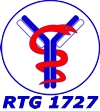TP B2: Autoimmunity alters the T cell receptor repertoire recruited into immune responses
Autoimmune diseases such as lupus erythematosus, rheumatoid arthritis and multiple sclerosis play a major role in today´s society. Such diseases are often associated with an increased risk of infections with influenza, pneumococcal disease or herpes zoster or an increased incidence of complications due to the compromised immune system. However, the underlying mechanisms are still under investigation. With the present project we study whether the T cell receptor repertoire recruited into an inflammatory context changes during the condition of autoimmunity. We will focus on the T cell dependent B cell response and the subsequent development of germinal centers which are the main source of autoantibodies found in many autoimmune diseases.
For this study we will immunize mice intravenously with sheep red blood cells (SRBC) to induce a T cell dependent B cell response. The SRBC model is well-established in our group. Due to previous studies with our model, we were able to choose three days (early response) and ten days after immunization (late response) as adequate time-points to study the spleen. Splenic cryo-sections will be subjected to laser microdissection to isolate distinct compartments (T cell zones, B cell zones and germinal centers). These samples will be analyzed by next generation sequencing (NGS) to determine the number of different T cell receptors, their frequency and their similarity. Additionally, we will define SRBC-specific clonotypes by comparing splenic samples of control mice to those of SRBC-immunized littermates and investigate their distribution within the different compartments during an immune response. In a second experimental setup, we will inject mice diseased with different animal models for autoimmune diseases with SRBCs, in order to explore if antigen-specific clonotypes are altered by autoimmunity.
We hypothesize that the T cell receptor repertoire recruited into the immune response against SRBC is modulated by the different autoimmune disease models. Furthermore, we expect differences between acute and chronic stages of disease. By comparing the repertoire of naïve vs. SRBC-immunized mice with and without autoimmune disease it might be possible to analyze how an autoimmune milieu influences the recruitment of antigen-specific T cells into an immune response. Unrevealing the mechanisms how the T cell receptor repertoire changes during autoimmunity might help to develop therapeutic strategies for several autoimmune diseases.

- Projects
- Projects
- TP A1 - B cell metabolism
- TP A2 - Expression profiling based drug design in EBA
- TP A3 -Differential roles and cell type specific effects of IL-17A and IL-17F in EBA
- TP A4 - Anti-laminin 322 mucous membrane pemphigoid
- TP A5 - C5a/C5aR in autoantibody induction
- TP A6 - Effects of immune-complexes with sialylated IgG antibodies...
- TP A7 - The effect of neutrophil extracellular traps (NETs) on human neutrophils in vitro
- TP B1 - Novel pemphigus animal model
- TP B2 - Autoimmunity alters the T cell receptor repertoire ...
- TP B3 - Metabolomics in autoimmunity
- TP B4 - Organotropism of leukocyte migration
- TP B6 - Pathomechanisms in experimental Systemic Sclerosis
- Associated projects
- MD projects
- Associated MD projects
- Concluded projects
- Projects






